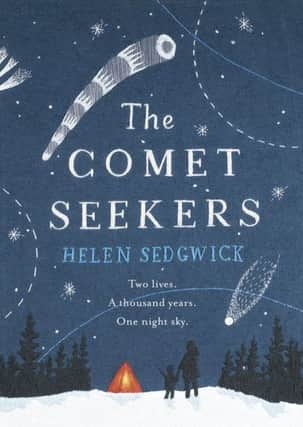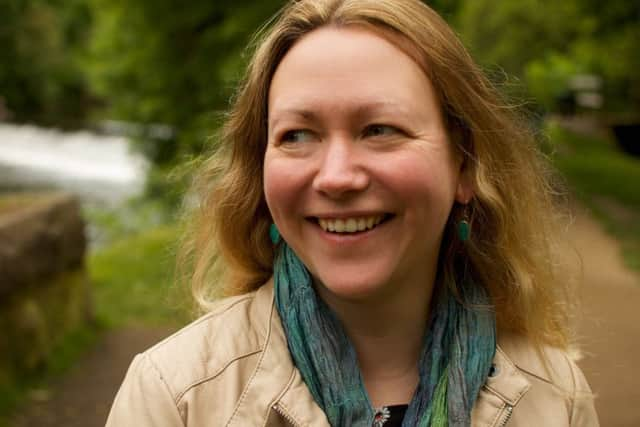Helen Sedgwick discusses her first novel


The skies above Helen Sedgwick’s house near Tain are, on clear nights, deeper and more layered with stars than anywhere else she has lived for years. If ever a comet passes across them, she’ll have no problem training her telescope on it and tracking it across the heavens.
Why comets? You’d understand if you read her new novel, The Comet Seekers, the only book I’ve ever come across which fuses astronomy, a love story and a thousand years of ghosts, and which she launches at the Edinburgh Book Festival tomorrow.
Advertisement
Hide AdAdvertisement
Hide Ad“Ever since I was a child,” she says, “I have always liked looking up at the skies, to find out what was there and to see if I could interpret it. It wasn’t enough that the stars were pretty, I wanted to be able to know whether constellations were related or to tell the difference between galaxies. I always wanted to know more.”


That wish to find out more about the secrets of deep space took her to university in Bristol, where she started off studying astrophysics. When this turned out to be far more about analysing spectra and programming computers to move remote telescopes than actually checking out the universe through an eyepiece herself, she switched to physics, and went on to do a post-graduate degree in the subject at Edinburgh.
She never even thought about creative writing until, five years after finishing her studies, she took an evening class and discovered that she loved it. By then she was working on a research project in Glasgow trying to create a “lab on a chip” device for cancer research. When she asked if she could combine that with studying for an MLitt in creative writing, her employers didn’t offer any objection. It was a turning point in her life.
Her eyes smile at the memory. “I just loved that course. It was absolutely brilliant. The workshops were so inspiring, and if the feedback you got about your work wasn’t always positive it was always useful. It was there that I became an editor as well as a writer, able to critically assess a piece of writing, to see how to help it reach its potential.”
Although she is too modest to point it out, she got a distinction in that course, and it helped her on her way to a plethora of jobs in the small world of Scottish literary publishing. After co-founding (with Kirsty Logan, a friend since the MLitt course) the magazine Fractured West, which ran for five years, she was reviews editor and managing editor of Gutter (started by two of her other colleagues on the course), and managing editor at Cargo Publishing.


All of which takes us a long way from comets, but only now have we reached the stage in her career where Helen Sedgwick might actually want to write about the things – or indeed to have the confidence to even attempt such a wildly imaginative novel.
It started with a short story she wrote for Algebra, an online literary magazine linked to Tramway that ran for four issues in 2012. “I was writing a lot of flash fiction then,” she explains, “and I wanted to write something based on series of apparently unconnected events, hoping that as you read the story the connecting fact would become clearer. The story had these completely different periods of time when there was a great comet visible in the sky. And as you read on, you’d realise that all of the people you’ve read about had been looking up at this comet, and that it had been circling around the solar system, returning every couple of hundred years or so.
Advertisement
Hide AdAdvertisement
Hide Ad“Because that’s exactly what fascinates me about comets. In their terms, they have this really small amount of time near earth, but then they return centuries later. And Earth is still there and must look more or less the same, but humanity is completely changed.
“I find that fascinating and I thought I could either have the story narrated by a comet – which would have been really weird – or I could give these people a voice. So then I thought I could make them ghosts.”
Yet when it came to writing the novel, all of that had to become background. The central story – how Sedgwick sums it up for her one-sentence “elevator pitch” – is this: “Two strangers meet in Antarctica on a research base and the novel loops back over a thousand years to find out what brought them to that point.” Those two characters are lovers, the family of ghosts figuring only in the family background of one of them.
Already, perhaps, you might be beginning to get a flavour of the kind of novel Sedgwick is aiming for. There’ll be some science, distilled into readability, about why comets, those “great, dirty snowballs hurtling through time and space,” fascinate her. There’ll be a sense of the past too, just as there was in that original Algebra story, which scampered from the Roman empire to the present in just 1,500 words. (In The Comet Seekers, the past is anchored in 1066 and the comet embroidered into a particularly enigmatic panel of the Bayeux Tapestry.)
All of that – the science in Antarctica (“that’s just wish-fulfilment; I’ve always wanted to go”), and the details of the ghosts’ past that flash by along with the comets above them – are so realistically portrayed as to enhance the novel’s more magical aspects.
The love between those two central characters is itself a kind of magic, as are the ghosts brought to half-life in the loved one’s imagination by the approaching comets, ghosts that would disappear if the character moved away, when death would once more have its hands on them. There is, then, a complex yet well-realised dance going on between death and love, past and present, remaining or leaving, as the comets wheel above human heads.
That mixture of science and fantasy is the course on which Sedgwick has already set her fiction. “I want to be one of those writers who has two different strands to their writing,” she says.
Advertisement
Hide AdAdvertisement
Hide Ad“I’ve just finished the first draft of my next book – feminist sci-fi, I’m calling it – which will be about a world in which women don’t have to get pregnant because we have created external wombs. It will look at what that does to society. So yes, I think my interest in science is going to come out quite regularly.
“But so is my interest in the fantastical – because I’d also like to write a horror ghost story set in Indonesia about the world’s largest plant. I like to have that element of the supernatural mixed in with real science, so it’s not just a juxtaposition between fact and fiction but between realism and something that seems quite incredible.” All of which, as you can see, is equally true about The Comet Seekers.
One last observation. When she was growing up in Chiswick, I point out, west London’s light pollution must have prevented her ever seeing the true glories of the galaxies. But here in Tain, where there’s not even the lights of a single house in the four miles between her garden and the Cromarty Firth to lighten the dark skies, she must surely enjoy looking at the stars through her telescope so much more.
“Er no,” she says, mildly embarrassed. “I’ve never had my own telescope. I’ve never actually watched a comet through one either.”
Well, she could have fooled me. In fact, she just has.
The Comet Seekers by Helen Sedgwick is published by Harvill Secker, price £12.99. Helen Sedgwick will be appearing at the Edinburgh Book Festival tomorrow.